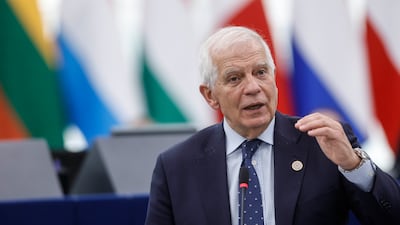Members of the European Parliament have pressed the EU’s top diplomat, Josep Borrell, to maintain vocal and consistent opposition to Israeli occupation of the West Bank, which has recently endured a surge in violence, raising fears of a new intifada.
“I will be clear once again: settlements are illegal under international law … and their expansion must stop, as well as the demolition and evictions of Palestinians from their homes,” Mr Borrell said during a debate on the state of democracy in Israel on Tuesday evening at the European Parliament in Strasbourg, France.
But Mr Borrell also called on the Palestinian Authority to play a role in defusing the violence and organise democratic elections, which have not taken place since 2006.
“The Palestinian authority must act too. They must redouble their efforts in terms of security co-ordination and work to prevent acts of terror that have claimed many Israeli lives,” Mr Borrell said.
Mr Borrell repeatedly defended the EU Parliament’s right to organise such a debate, pointing to accusations made to him over the phone earlier in the day by Israeli Foreign Affairs Minister Elie Cohen that the bloc was meddling in Israeli affairs.
“I hope that today will be a good discussion to show to minister Cohen that the Parliament is ready to discuss what’s happening in the Middle East, and how we can contribute to the peace process, and it is not at all to have an anti-Israeli position,” Mr Borrell said.
Mr Borrell said that the EU remained “a strong believer in the two-state solution”.
Titled Deterioration of democracy in Israel and its consequences on occupied territories, the debate came one week after the European Council said in a statement that it was “deeply concerned by the increasing violence and extremism in Israel and the occupied Palestinian territory”.
Israeli media reported on Wednesday that Mr Borrell’s statements during the debate had prompted Israel to prevent him from visiting the country.

Questioned during a briefing in Brussels, the Commission’s lead foreign affairs spokesman, Peter Stano, denied such reports, saying that the bloc was unaware of any ban. “You cannot be prevented to visit if you are not invited,” Mr Stano told reporters.
During the hour-long debate, MEPs sharply criticised Israel both for what socialist Portuguese politician Pedro Marques described as a “de-facto annexation of the Palestinian territories” and a divisive legal overhaul that is being pushed through the country’s parliament and has triggered huge protests.
“The EU and Israel enjoy a deep friendship but friendship also means pointing out concerning events,” said German politician and member of the centrist Renew group, Nicola Beer.
“I’m worried about the spiral of violence in the Palestinian areas. I’m concerned about the plan to reform judiciary. It would lead to an end of division of power and a lack of independence of the judiciary,” she said.
Michael Gahler, a German Christian Democrat, said that such legislation must be a “a no-go in a functioning democracy”.
“We want to defend Israel’s right to exist as the Jewish state but we cannot defend what is illegitimate,” said Mr Gahler, who commended Israeli President Israel Herzog’s conciliatory efforts.
Jordi Sole, first vice-president of the Greens group, lambasted the “growing violence, expansion plans for illegal settlements, de facto annexation turning into a covert de jure annexation, daily discrimination against Palestinians, demolitions” in the occupied Palestinian territories.
Mr Sole, a Spanish politician, described these practices as making “a lasting peace an impossibility".
He added that if the judicial reforms go ahead, Mr Borrell should ensure that there be “consequences” for EU-Israel relations.


